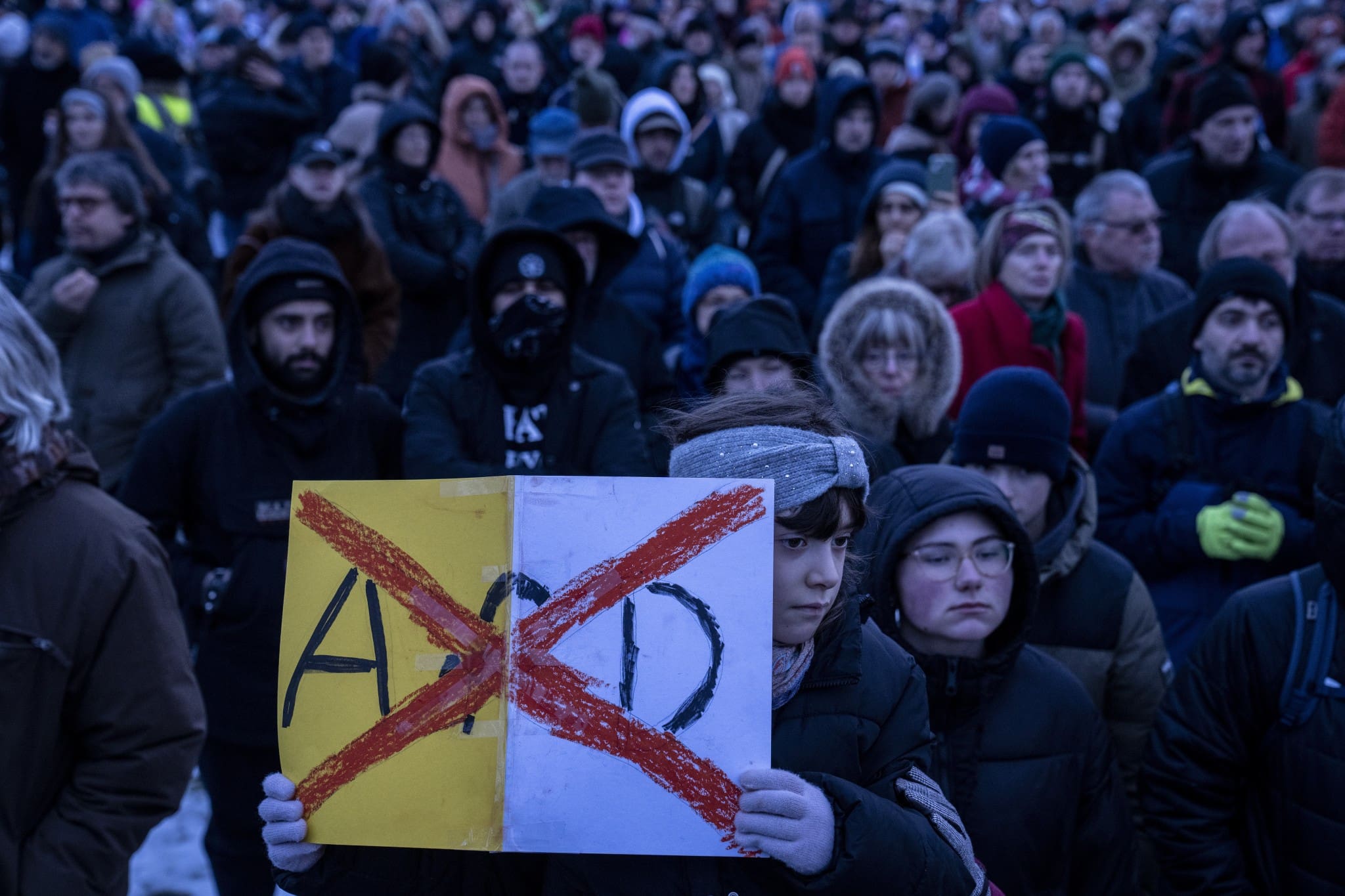Despite mass protests that allegedly saw at least 300,000 people demonstrate against the Alternative for Germany (AfD) party, two new polls showing the AfD has lost some support following the protests actually feature somewhat good news for the party.
Media commentators are celebrating that the AfD lost 1.5 percentage points in the INSA poll, dropping from 23 percent to 21.5 percent. In another RTL poll, the party lost 2 points, falling to 20 percent. The drop follows protests that were promoted by NGOs, Antifa, members of the left-liberal government, and other organizations against the AfD over the weekend.
However, the polls also need to be put in context. Given the mass media campaign currently directed at the AfD and the push for protests, the AfD lost remarkably little support. In fact, a 1.5- to 2-point percentage drop could be a blip, and the AfD could regain its strength over the coming months.
Currently, the AfD is facing around-the-clock news coverage for a meeting in Potsdam that involved identitarian Austrian activist Martin Sellner. The publication Correctiv, which receives federal government financing along with funding from billionaire oligarch George Soros, is being accused of using illegal espionage tactics to gain access to the meeting, which discussed “remigration” of foreign nationals.
[pp id=104447]
The story, presented as a bombshell, has mostly fizzled and done little to affect the AfD’s support. The response from the party has been a mix of denials from some and others who have embraced the positions taken in Potsdam. While no major leading figures from the AfD were present at the meeting, some AfD politicians noted that the AfD’s platform is very clearly in favor of mass deportations, which could see millions of foreigners sent home.
The fact that the AfD saw such a small drop in its support given the coordinated media campaign around the remigration discussion in Potsdam shows there is a strong appetite for deportations among the German populace. A strong majority of Germans now say that migrants bring more disadvantages than benefits.
[pp id=104328]
Regarding the actual demonstrations against the AfD, only a minority of Germans actually support them.
“The demos against the AfD are supported by 37 percent of Germans. They have an impact,” said INSA head Hermann Binkert, who said he saw a connection between the demonstrations and the drop in support for the AfD.
It should be noted that 57 percent of Germans say they could never imagine voting for the AfD, according to INSA, which means there are still many Germans opposed to the party.
New BSW party has little impact on AfD’s support
Another factor must also be noted regarding the latest polls. For the last year, experts have predicted that Sahra Wagenknecht’s new party, BSW, could cut deeply into the AfD voting bloc. The polling, however, tells another story.
Since her party launched this month, INSA actually included BSW in the new poll, which was listed as “other.” Of the 11 percent of Germans who said they would vote for other parties, 7 percent say they will cast a vote for BSW.
Despite BSW’s strength, it is having at best a marginal effect on the AfD, but it is not the only poll that included BSW. The RTL poll shows even worse results for the BSW, where it only got 3 percent of the vote.
If the BSW were to actually only achieve 3 percent at the polls, it would not be eligible to enter parliament, which requires at least 5 percent. The result is a far cry from what analysts were saying before the party launched, that it could achieve a theoretical 12 percent of the vote.
At the same time, the creation of the BSW split the Left Party, which is now only polling at 3 percent as well. That means both the BSW and the Left party would be excluded from parliament.
The AfD also continues to gain paying members and now has 41,000 who belong to the party, with nearly a thousand joining in the last week. The strength in membership growth continues to be a positive sign for the party, especially when many of these members face substantial surveillance from the domestic spy agency, the Office of the Protection of the Constitution, which has declared the AfD a “right-wing extremist” group in three eastern states; this gives the agency significant spying powers over all members of the party.





